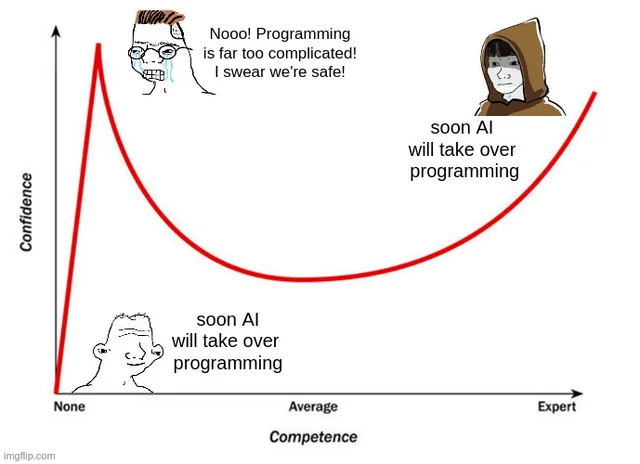Is Coding Becoming Irrelevant? 8 Rules to Learn Code in 2025

Some people are 100% certain that there’s no need for anyone to learn to code anymore. AI will take over here soon, so all people who are interested in it should look elsewhere for opportunities — like in plumbing, as if that’s a job that everyone’s really eager to do.
Well, I strongly disagree, and you have a right to disagree with me. I’m not hating, but let me point out a few things first.
The AI Stats
The biggest use case for AI right now is web and mobile app development. Sounds like a problem, right? Well, yes — until you see that only 6.1% of US companies are using AI in their business. Yes, while Microsoft, Amazon, and the like fill your news feeds daily, they are not the only companies that exist.
To add to that, developers make up only 2.5% of the workforce, and it’s only natural that we are going to flock to this technology, being technical people — and not the bank teller whose job will be replaced in the future. So, 94% of US companies are not using AI.
When they decide to, I want to be on the technical side of things. I want to be at the forefront of innovation with the skills to join in.
AI Consulting and Startups

Another thing is, AI consulting and AI startups are blowing up right now. People using low-code and no-code tools are able to get an MVP of their app up and running without needing to know any code at all.
That’s great, but 100% of them go on to say this: when you get this MVP up, and you start getting customers, then you’ll need to hire a dev team to turn that app into what you actually want it to be.
Opportunities in the Market
The economy is what it is. It’s tough, but the job listings are still there. They didn’t disappear. Everyone is still hiring devs, and 94% of companies are not using AI.
As AI continues to be adopted, it will be the technical people that understand coding and problem-solving leading the way into new frontiers. Sure, you’ll need to adapt along the way. Everything won’t remain the same as it is now, but learning to code right now is not a lost cause.
Again, feel free to differ with me. That’s fine.
The Reality of Coding

Guys like these think I’m leading you all astray. If you come to that conclusion, that’s okay. At the end of the day, we all have to make our own decisions. But I think those who want to get into it with hard work and realistic expectations can still do so.
But listen closely: it’s not for everyone.
This is where things get real. Not everyone will succeed in this field. In fact, there are certain traits that make you more prone to fail than others, which is why so many do.
What I want to do here is give you eight rules for learning to code in 2025.
Should you choose to do so, these eight rules are going to help you determine if you should learn to code, if you’ll be successful or not, and some of the steps you’ll be forced to take along the way?
These are eight things you will have to do.
Before that if you love reading content related to tech industry read this article as well:
Top 5 Mistakes Beginner Web Developers Should Avoid
Rule 1: You Have to Love It
This is where things are different today. Five to six years ago, there was a huge demand, and you could find your way in without really loving it. You were probably loving the paycheck or the starting salaries, but not really loving the coding part of it.
This may be why we now have so many people tired of what they do. Yes, there are more and more videos, threads, and articles about people hating what they do, despite making good money or having reached a point in their life where they always wanted to be.
So first, if you try it out and fall in love with it, it may just be for you, and it may be a pursuit that you can succeed at. But if you’re like “eh,” then it’s going to be a tough road.
When I learned, it was easier to get in, yes. But I knew at that point I had to do it, whatever it took. I loved it that much. Make sure you do as well.
Rule 2: You Have to Put in the Work

There’s no shortcut to learning to code. Yes, AI can write HTML and CSS very well and can give us all the answers we need. But you still need to learn it. You can’t skip CSS if you want to be a front-end dev. You can’t skip JavaScript and learning about the DOM and promises and all of that.
Problem-Solving and Building Projects
You have to get good at it, solve problems with it, and build projects with it. This takes time, and this is where many people fall off the path. It’s probably for the best — if you write Python for three months, and you’re so sick of doing it to reach your goals, then perhaps you don’t really want to do this type of job. Or perhaps you’re wasting your time or on the wrong path overall.
In addition, this is where you have to set a clear path of how you’re going to learn and what end goal you’re going to be at, and see it through. Because we have AI now doesn’t mean you get shortcuts. It’ll be a lot of work, but you have to put in the hours and write a ton of code to learn the craft and make yourself employable.
Solid Foundation
If you were to put in nine months of coding and had a solid foundation, and then AI takes a huge leap forward, you still have this umbrella of dev skills and understand what’s happening under the hood. You can take it further than anyone using low or no code could ever imagine. You actually have a foundation that is prime for this upcoming AI market. But you have to put in the work, write a lot of code, and learn the craft.
Rule 3: You Have to Live It
This is a trait I see of developers who continue to succeed day in and day out in this industry. They live this stuff. Their Twitter is filled with coding stuff, their blog is technical, they keep up with the latest software news and updates, and they literally live it. They don’t get tired of it.
If you’re not that type of person, this industry might not be for you. Developers who thrive are constantly learning and engaging with the tech community.
Rule 4: You Need to Build Projects

This is essential. You can’t just learn coding concepts without applying them. Employers look for experience, and projects are how you demonstrate your skills. These projects don’t have to be massive; they just need to show that you can solve problems and deliver something functional.
Building projects will also teach you how to troubleshoot, research solutions, and understand the nuances of programming languages and frameworks. This hands-on approach is what makes you job-ready.
Rule 5: You Have to Be Persistent
Coding can be frustrating. You’ll encounter bugs, errors, and roadblocks that seem impossible to overcome. This is where persistence comes in. The ability to push through challenges, seek help, and keep learning is what separates successful developers from those who give up.
Remember, every experienced developer has been where you are. They didn’t give up, and neither should you.
Rule 6: You Must Network

Networking is often overlooked but incredibly important. Join online communities, attend meetups, and connect with other developers. This will not only help you stay motivated, but also open doors to opportunities you might not find otherwise.
The tech community is vast and supportive. By engaging with others, you’ll learn from their experiences and get guidance on your journey.
Rule 7: You Have to Keep Learning
Technology evolves rapidly. What you learn today might be outdated in a few years. To stay relevant, you need to adopt a mindset of continuous learning. Keep up with new trends, tools, and programming languages.
This doesn’t mean you need to learn everything, but you should focus on the areas that interest you and align with your career goals.
Rule 8: You Have to Believe in Yourself
Impostor syndrome is real, and many developers struggle with self-doubt. But you have to believe in your ability to learn and grow. Everyone starts somewhere, and no one knows everything. Trust the process, celebrate your progress, and remember that every expert was once a beginner.
Conclusion
Learning to code in 2025 is not a lost cause. It’s an opportunity to be part of an ever-evolving industry. While AI and low-code tools are changing the way of software development, there’s still a need for skilled developers who understand the fundamentals and can innovate.
If you follow these eight rules, you’ll be better equipped to navigate the challenges and make a successful career in coding. So, if you’re ready to put in the work, live it, and stay persistent, this path might just be for you.
You can also find me on these platforms, consider following me there to support my work.









